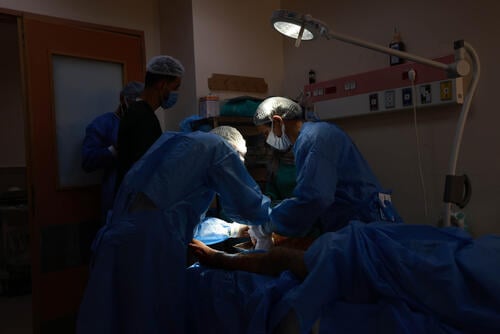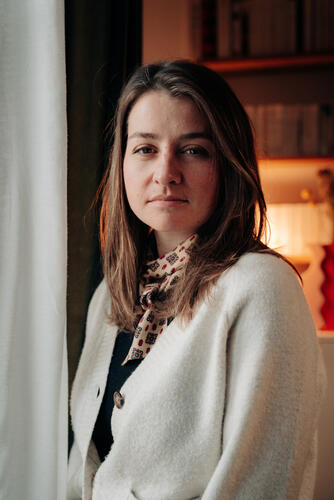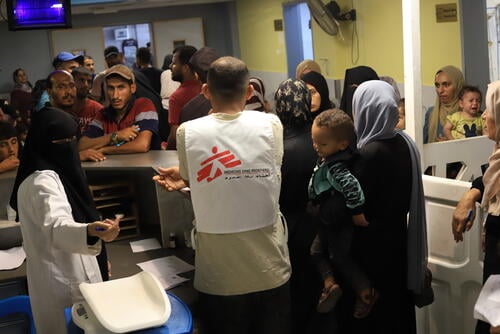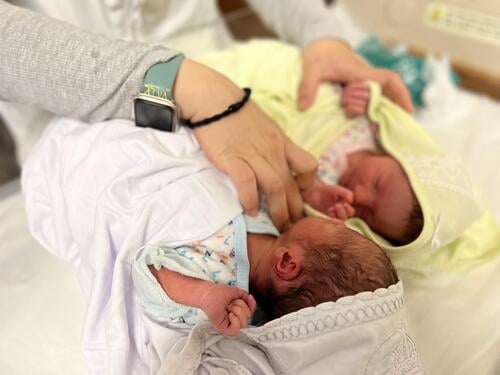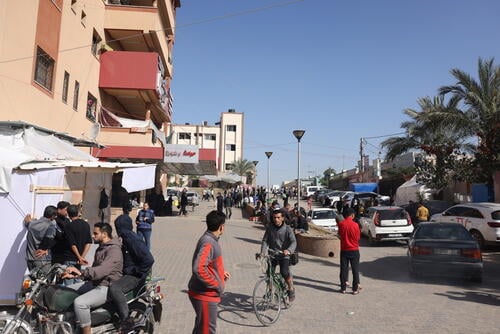Marie-Aure Perreaut Revial, Médecins Sans Frontières (MSF) emergency coordinator, recently returned from Gaza. Here she bears witness to the experiences of the the staff and patients she met during her time there.
Daily, dozens of patients are rushed into the emergency department of Al-Aqsa Shohada Hospital, in Gaza’s Middle Area. No triaging is possible at the bomb sites, it’s a race for ambulance crews to save the ones that can still be saved.
The emergency department is chaos. Critically injured patients lying on cardboard boxes: the beds are full. There are journalists attempting to tell the story of what’s happening here to people who seem determined not to listen. As they step back to record the scene, they sometimes tread, accidentally, on the bodies lying on the floor. Some days the hospital receives more dead than injured.
We first visited Al-Aqsa on 23 November, the day before the announced “humanitarian pause”. That day, the hospital received 314 wounded people and 121 who were dead, or died shortly after arrival. They had expected these overwhelming casualties, explained Gazan colleagues, reminding us that this is not a new conflict. “It’s always like this before a truce,” one colleague told me.
After that first visit, our team began working alongside the staff at Al-Aqsa. It had capacity for 200 in-patients before the war. By the end of December, they had more than triple that number.

Systemic destruction of healthcare in Gaza
Impossible decisions
One day we were alerted that an MSF staff member and his family had arrived at the emergency department, badly injured. Colleagues rushed to find them as they arrived amidst chaos.
Later Dr Samir* told me, “I had to make a choice: I saw Ghassan* and his son, they needed me, but next to them I saw a woman critically injured, she also needed me. What was I supposed to do?”
Healthcare workers are forced into decisions like this every day.
Ghassan’s son had been hit by shrapnel. He underwent multiple surgeries that day. The injuries to his throat affected his ability to speak. His mother lost an eye. That day, when Dr Samir came out of the operating theatre at 1 am, his MSF jacket was covered in blood.
By the end of December, the team in our wound-dressing unit were seeing on average 150 patients per day, almost all with burns or blast injuries. Many were children. One of our surgeons told me about dressing the wounds of babies who had lost their legs. It stayed with him. Babies who had never learned to walk, and never will.
One of our surgeons told me about dressing the wounds of babies who had lost their legs. It stayed with him. Babies who had never learned to walk, and never will.MSF surgeon
Wounded child, no surviving family
Some of those children have a new acronym written on their file. “WCNSF”, which stands for wounded child, no surviving family.
Salma*, nine years old, is one of thousands of WCNSF. She suffered a fractured skull after her house was shelled. One of her legs was broken, the other had been amputated. We met her in the intensive care unit. She still didn’t know that she was the only one who made it out of the rubble alive: the exhausted staff wanted to let her recover physically first.
One of the biggest challenges facing hospitals in South and Middle Gaza is bed capacity. The beds are needed to treat patients in critical condition, but those who have been stabilised have nowhere to go. Where should we send a patient like Salma? What do we say to her?
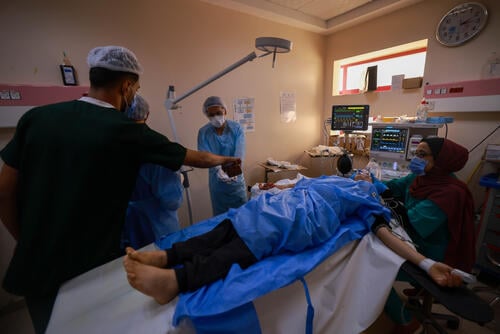
Healthcare under attack
Salma was being treated at Al-Aqsa. Like the few other hospitals still partially functioning in Gaza, it can only provide trauma care. Health facilities have faced attacks, evacuation orders, or been starved of supplies, clean water and electricity: I can barely describe the destruction of healthcare I have witnessed.
Many hospitals and basic health centres have been forced to close; services like maternity care or chronic conditions essentially no longer exist.
So, are the people of Gaza no longer sick? Is there no more appendicitis? No asthma or gastro-enteritis? The truth is, that in overcrowded shelters, without food and water, lacking the most basic hygiene conditions, people are sicker than before, but they no longer have access to healthcare.
In mid-November, MSF started supporting the Shohada Health Centre, the biggest provider of general healthcare in Khan Younis. The needs were huge. After just one week, we had already provided outpatient consultations for more than 600 people, half of them under the age of five.
They had respiratory infections, skin diseases or diarrhoea, all of which can cause severe complications, especially in young children. All are a direct consequence of their dire living conditions.
Our mental health team held art sessions with children. Some drew their families killed during bombings. They drew the legs and arms of their mothers on the ground, beside their bodies.Marie-Aure Perreaut Revial, MSF emergency coordinator
Women were rushed in, so dehydrated they had collapsed. Mothers begged for baby formula: with nothing to eat, their breast milk had stopped and their babies were hungry.
On 1 December, as the ‘pause’ ended, the neighbourhood where the health centre was located was ordered to evacuate. Our team was forced to leave and the health centre ceased to function.
Children’s trauma
One of the thousands of patients who lost their access to care that day was a five-year-old boy being treated by our psychologist. He had told her in a session that he wanted to die.
In Al-Aqsa hospital, our mental health team held art sessions with children. Some drew their families killed during bombings. They drew the legs and arms of their mothers on the ground, beside their bodies.
When they told me about this I thought not only about children, but also about the psychologists, holding this trauma whilst going through the same experiences themselves.
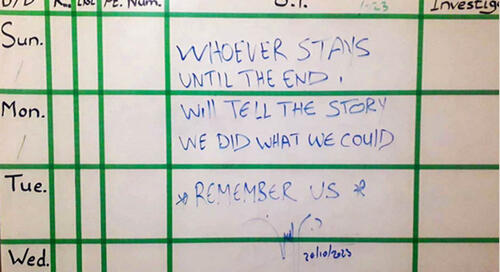
MSF staff killed
Our team members in Gaza have lost family members, homes, colleagues. One colleague learned on social media that her sister had been killed. She came to work anyway, to forget, because there’s nothing else to do.
In November, An attack on Al-Awda Jabalia hospital killed two of our doctors, Dr Mahmoud Abu Nujaila and Dr Ahmad Al Sahar.
The third member of their team wasn’t there that day – he had come to work with us in Al-Aqsa hospital. Later, when two survivors of that same attack arrived in Al-Aqsa, this doctor was the one who dressed their wounds.
Healthcare workers in Gaza are being depicted as heroes. But calling them heroes suggests that they can magically alleviate this unbearable suffering on their own. It suggests they don’t need support.
The day Dr Samir was injured when the building next door was bombed, his daughter saw him bleeding. She told him, “Doctors aren’t supposed to bleed.” They do though.
The people who have the power to stop this humanitarian catastrophe do not do so. While they hesitate, doctors, nurses, Palestinians are being massacred.Marie-Aure Perreaut Revial, MSF emergency coordinator
The illusion of humanitarian action
Foreign journalists often ask me how Gaza compares to other crises I have worked in. I say that in Gaza there is a humanitarian crisis, but no humanitarian response.
Israeli officials make claims about the number of trucks being allowed through Rafah daily, as if there is an acceptable ratio between the number of trucks and the number of people killed. But humanitarian aid is not about trucks, and the supplies being allowed in no way match the scale of the needs.
A humanitarian response is where we can assess, plan and work according to the needs of people. Instead, MSF and a few international organisations are delivering very limited medical care under wildly abnormal conditions.
Healthcare workers in Gaza are holding the values of humanity in a time of great darkness. Meanwhile, the people who have the power to stop this humanitarian catastrophe do not do so.
While they hesitate, doctors, nurses, Palestinians are being massacred.
When I left Gaza, I was asked by my colleagues to bear witness to their stories. I saw just the tip of the iceberg. And that small amount was unbearable to see.
Since Marie-Aure wrote this testimony, the Al-Aqsa hospital has come under an evacuation order and the MSF team has been evacuated.
*All names have been changed.



